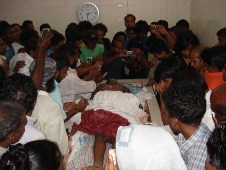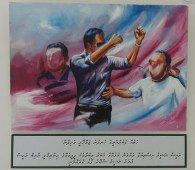On the night of August 29, groups of uniformed officials of the Maldives Police Service were observed going around Malé in trucks, singing songs and mocking opposition MDP activists – the same ones they brutalised in a nationally televised theatre of violence during the events of February 7th and 8th.
The next morning, large groups of uniformed police were huddled together on the streets in their riot gear, their faces concealed by balaclavas, while the country awaited an announcement from the Commission of National Inquiry (CoNI) appointed by the Waheed regime to ‘investigate’ the controversial transfer of power.
The announcement surprised exactly nobody; the council of pigs had found in favour of Napoleon. There was no coup, it ruled. In fact, there wasn’t even a police mutiny. And if there was one, it didn’t quite break any law, the report found.
By evening, the Waheed regime’s Police Service – now apparently empowered to make their own laws – had declared that calling them ‘traitors’ was now a crime, and any person indulging in the act would be arrested.
The declaration followed in the footsteps of two citizens being arrested in recent days for the offence of calling Waheed a ‘traitor’. Journalists witnessed one lady being taken away on 30th August, allegedly for the crime of taking photographs of the police.
Over the course of the day, scores of MDP protesters would be detained by the police in ancticipation of large scale protests against the findings of the report, and the continued demands for early elections.
With the international community apparently eager to wash its hands off the Maldives, there will be plenty of time and opportunity for the police to deal with troublesome critics over the remainder of Waheed’s rule.
The CoNI Report
Ahmed ‘Gahaa’ Saeed, the sole representative of President Nasheed on the 5 member Commission, resigned the day before the report was to be made public. In a press conference following the publication of the report, Saeed pointed out what appear to be serious lapses in gathering evidence and recording testimony in preparation of the final report.
Among them, he highlighted that CCTV footage was provided for only 3 out of 8 cameras around the MNDF area, and even those had hours of footage edited out. No sufficient explanation was given by the security forces.
The Commission was not provided any CCTV footage by the Police and the President’s office, according to Saeed. Nor was CoNI granted access to information gathered by the Police Integrity Commission.
Furthermore, no interviews were held with any official of the notorious ‘Special Operations’, the highly trained riot control force that played a crucial role in the ouster of the first democratically elected government, as well as the subsequent targeted attacks on civilians, MDP leaders and party activists. Also missing was the testimony of Umar Naseer, the Deputy Leader of PPM who has publicly declared his role in the overthrow of the elected government, and revealed the existence of a ‘command centre’.
According to Saeed, other prominent interviewees alleged to have played a role in the coup d’etat appeared to have been coached, with all of them giving standard, non-commmital responses.
None of these alleged lapses or limitations were highlighted in the final report.
Illegal duress
Section 4F of the report, defining ‘Coercion in Law’ begins as follows:
“Coercion, as used in the Decree, refers to the American legal concept of illegal duress or the English legal concept of intimidation. This is a real threat delivered by one or more wrongdoers to another to harm and injure the latter or his family if the victim does not do something as demanded”
But surprisingly, the report makes no mention of the leaked audio recordings, first aired by Australia’s SBS Dateline program, that clearly reveal the President pleading for the safety of his family in return for his resignation on the morning of February 7.
There were a few other sections of the report that raises eyebrows. Regarding an allegation about an SMS purpotedly sent by the then Permanent Secretary at the Ministry of Environment, allegedly asking for the disbursement of 2.4 million Rufiyaa to the mutinying cops, the Commission had this to report:
“[Mr. Saleem] debunked the message effortlessly, claiming that he did not recall sending such a message. After hearing him, the Commission would not invade and investigate the privacy and personal affairs of all and sundry…”
While the first sentence suggests some truly extraordinary levels of trust placed by the Commission in the testimony of the accused, the second reveals an inexplicable reluctance in pursuing every possible avenue of inquiry to uncover all relevant facts behind the power transfer – which, by definition, was the Commission’s job.
Furthermore, the report seems to paint a picture that the President was completely secure and faced no threat inside the MNDF HQ, when in reality it is undisputed that sections of the already outnumbered military had broken ranks and joined with the hostile police and opposition protesters in rioting outside.
Video recordings aired on National television showed military officers refusing to obey the President’s orders. Retired colonel Mohamed Nazim, in the video clip where he is seen addressing the mutinying forces outside, talks about being received warmly inside the MNDF HQ.
Indeed the CoNI report itself quotes him as saying “When I entered the military headquarters I was given a very happy scene. Everyone within the military lifted me up and very completely revealed their support for me. God willing, things will happen today as we want”.
If one is familiar with the fate of former Maldivian rulers facing chaotic mobs, then one realizes that guns were not necessary to threaten the President’s life. All that was required was for a solitary soldier to throw open the gates.
The report itself states elsewhere that all command and control was lost.
All of this appears entirely contradictory to the conclusions of the report that asserts that President Nasheed remained in control and had legal options to employ force to deal with the situation, which he refused to do – and therefore could not claim he resigned under duress.
This lends some credence to President Nasheed’s claims that the report was prepared with the political situation in mind, rather than with any serious ambition of uncovering facts.
Options before the MDP: Way forward
It is unrealistic to imagine that ordinary civilians, no matter how numerous or passionate, can topple a regime that is protected by a modern, trained, unsympathetic – and in this case, hostile – police and armed security forces.
The police have superior training, equipment, strategy, organization, intelligence gathering and other resources to counter and defeat any move that civilian protestors could possibly make. The same forces that protected the dictator Gayoom against an overwhelming tide of unpopularity can sufficiently protect his alleged puppet.
Given these realities, it is wise that President Nasheed has chosen to make a major concession and accept the findings of the report, while calling to implement its much welcome recommendations that include the strengthening of various institutions such as the HRCM, Police Integrity Commission, JSC and the Judiciary while also calling for swift action to be taken against rogue cops, who the report acknowledges had engaged in acts of brutality towards civilians.
While there remain serious injustices to be addressed and plenty of reasons for the MDP to be rightfully outraged, the path forward necessarily involves having to break the political gridlock that has paralyzed the nation since late last year.
It is clearly in the best interests of the public that the All Party talks resume and the daily business of running the nation and fixing the economy take centre stage again.
There are important lessons to learn from February 7. President Nasheed and the MDP need to introspect and reflect on their own considerable mistakes and poor judgments. The most important among them, perhaps, is committing to uphold the rule of law without any compromises, no matter how morally justifiable it may be.
With under a year left for the next scheduled elections, the MDP would be well advised to direct its efforts and resources on going back to the people and rallying them behind larger ideals.
Ultimately, one must remember that it was the people who handed a mandate to President Nasheed in 2008, and despite the ugly precedent set by the police and military, it will hopefully be the people once again who will make the decision in 2013.
So long, and thanks for all the democracy
With the publication of the CoNI report, and the apparent willingness of the international community to confer the same legitimacy on Waheed that it once granted the iron-fisted Gayoom – ostensibly with ‘stability’ in mind – the clocks have effectively been turned back a few years.
The Maldives’ unprecedented democratic revolution that began in the early 2000’s has ended prematurely, and many of the gains made since then have now effectively been reversed.
After three years, the Police have once again become an entity to be feared and loathed. The familiar intimidation of the media, and bullying tactics that were so widely prevalent during the Gayoom dictatorship is also back.
Waheed’s regime has been outright hostile to the free media, repeatedly barring the only opposition-aligned TV station from covering President’s office press conferences, and permanently withdrawing police protection for the channel’s reporters – despite explicit constitutional safeguards upholding media freedom. There is plenty of visual evidence of Raajje TV’s reporters being harassed and pepper sprayed at close range by the police; targeted attacks on the station by pro-government goons in August forced the station to interrupt services.
Citizens now face arrest for merely calling Waheed and his police forces ‘traitors’, whereas his regime regularly and unapologetically refers to citizens demanding early elections as ‘terrorists’.
The runaway judiciary remains weak and ineffectual, and there is no longer an elected President in power with any interest in fixing this crucial, but broken third leg of the base on which the country’s democracy was built to stand.
With a spineless media, a lethargic civil society, an incompetent Judiciary, weak institutions and watchdogs, a heavily politicized Police and military, not to mention the overarching influence of money and corruption in the whole process, the gargantuan task of achieving practical democracy in the Maldives appears forbidding, if not downright impossible.
To sow the seeds for a new revolution, the MDP needs to go back to the grassroots and educate the public.
February 7: the legacy
February 7 has left in its wake some very unwelcome precedents and niggling questions.
First among them is the newly acquired role of the police and military in determining the transfer of power, which the constitution had originally envisaged as being the sole prerogative of the voting public.
Will all future governments of the Maldives be required to buy the loyalty of the uniformed services with a range of perks, pay hikes, unprecedented promotions and turning a blind eye to their excesses and brutality in order to remain in power, as demonstrated by the Waheed regime?
Shall the Maldives follow in the footsteps of Pakistan that, over 65 years since independence, has failed to see a single democratically elected government complete a full term?
Finally, will the Maldivian judiciary ever become a house of justice for the public? Or will it remain perpetually overrun by incompetent fools, resistant to any external attempt bring them in line with the ideals enshrined in the constitution?
Does the Maldivian public really stand a chance to complete the democratic transition process we embarked on nearly a decade ago? Or will the next guy to attempt this Herculean task also pay the same price that Mohamed Nasheed did?
All comment pieces are the sole view of the author and do not reflect the editorial policy of Minivan News. If you would like to write an opinion piece, please send proposals to [email protected]
Likes (0)Dislikes
(0)Dislikes (0)
(0) 
